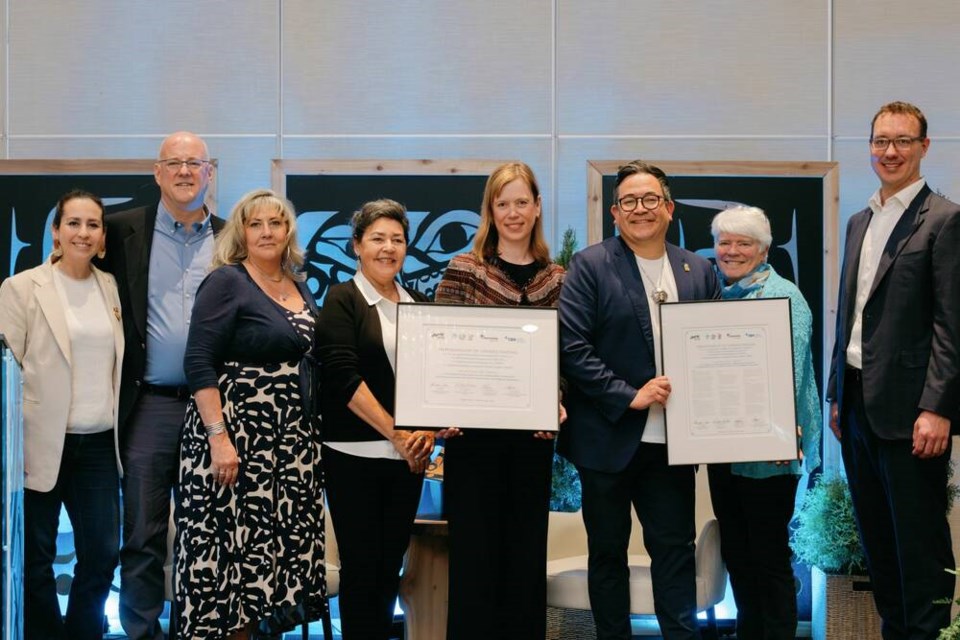Provincial organizations are helping boost accounting job opportunities for Indigenous communities with a new program.
Last month, a memorandum of understanding was signed in Vancouver by the Chartered Professional Accountants of British Columbia (CPABC), Aboriginal Financial Officers Association of British Columbia, MST Education and Training Society and Humanity Financial Management Inc. to develop education, mentorship and employment opportunities for an Accounts Payable Program.
The new program will help unemployed or underemployed Indigenous individuals receive hands-on training and exposure in entry-level accounting jobs and other paths. The Sḵwx̱wú7mesh (Squamish), səlilwətaɬ (Tsleil-Waututh) and xʷməθkʷəy̓əm (Musqueam) Nations will be the first to pilot the new initiative.
“I think there is a recognition that we need to do more to provide education and opportunities to Indigenous peoples, and this was seen as a great entry point where there was a need for more people with skills in accounts payable,” said Lori Mathison, president and CEO of the CPABC. “So everyone kind of just pulled together to come up with an idea of a program that could really make a difference.”
CPABC is the training, governing and regulatory body for over 40,000 chartered professional accountant members and 6,000 candidates and students. The organization’s mission is protecting the public through enforcing high professional and ethical standards in the accounting industry and contributing to advancing public policy.
The Accounts Payable Program aims to encourage more Indigenous people in the accounting industry, a field they’re underrepresented in.
In a CPABC Indigenous strategy update from 2022, the organization found 286 members and 53 B.C. candidates from one of their educational programs had self-identified as Indigenous. The strategy noted the numbers represent just over 0.6 per cent of total membership and less than one per cent of B.C.’s total candidate population.
Since then, Mathison said that number has grown to 331 CPABC members who self-identify as Indigenous, 285 of whom are B.C. residents.
Squamish Nation councillor Sxwíxwtn (Wilson Williams) said having more Indigenous people in the finance field is a growing need.
“I think that this opportunity definitely broke some barriers and is creating pathways to collaborate,” Williams said. “It’s creating accessibility, it’s strengthening our partnership, but also highlights our three nations' needs, and the openness to these entities willing to work together.”
Williams said the Squamish Nation has a huge financial department, but only around 15 per cent are from the nation.
That number is a “glaring” capacity need Williams said in comparison to other departments, which have higher percentages of either Indigenous people or Squamish Nation members.
“We’re hoping to carry that smoke signal home to our families, to share the story that this is an opportunity that you should endure, getting in the finance field,” he said.
The program will also provide capacity development for First Nations governments, business entities and Indigenous organizations to support the needs of growing Indigenous economies, according to a press release.
Former chief for the Tsleil-Waututh Nation Jen Thomas said the new hands-on training programs will open new pathways for potential employment in financial fields and provide new education opportunities.
"Investing in our next seven generations is a priority for our Nation, and we greatly appreciate the support," Thomas said in a press release.
Williams said the program is a meaningful step in investing in financial careers, but also looking forward.
“We’re looking at financial careers and building that financial capacity within our nations, and [there’s] no better way to invest in our people and their skills, but we’re investing in our future,” he said.
Mathison said the program’s development is currently underway, with the pilot aiming to launch next winter with its first cohort of students.
Based on the results of the pilot, she said they might be able to expand the program into other areas and Indigenous communities.
Abby Luciano is the Indigenous and civic affairs reporter for the North Shore News. This reporting beat is made possible by the Local Journalism Initiative.
https://bsky.app/profile/abbyluciano.bsky.social
Want to stay updated on North Vancouver and West Vancouver news? Sign up for our free daily newsletter.




